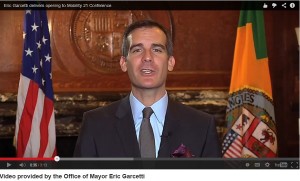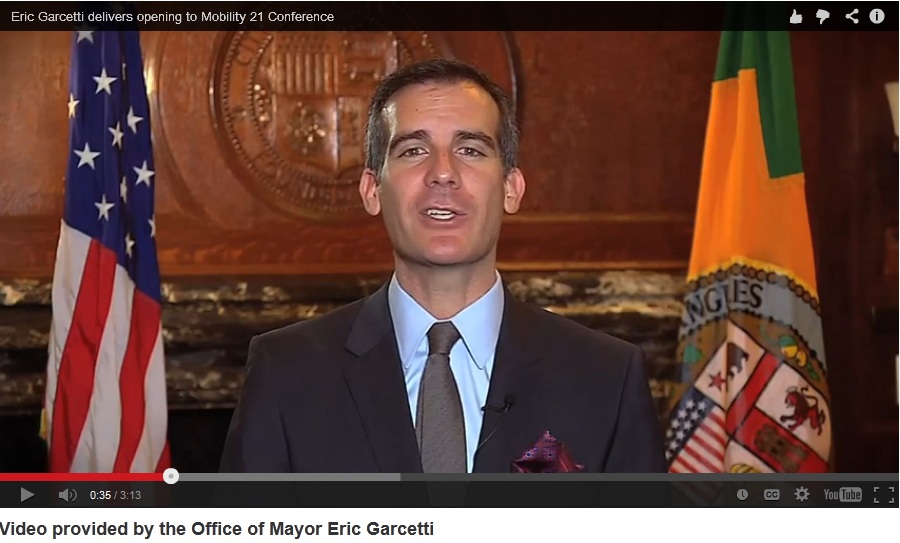 More than 1,000 business, transportation and elected leaders attended the 2013 Mobility 21 Southern California Transportation Summit held October 29 at L.A. Live. The annual conference addresses challenges and opportunities facing Southern California’s infrastructure.
More than 1,000 business, transportation and elected leaders attended the 2013 Mobility 21 Southern California Transportation Summit held October 29 at L.A. Live. The annual conference addresses challenges and opportunities facing Southern California’s infrastructure.
Los Angeles Mayor Eric Garcetti was in Washington, D.C. to lobby for federal transportation funds, but taped a message for the morning assembly (featured on LAStreetsblog) announcing he was working with cities across L.A. County to develop ideas for another transportation ballot initiative.
Brian P. Kelly, Secretary of the California State Transportation Agency, discussed Governor Brown’s reorganization of the state’s transportation programs, and the administration’s goals of coordinating policies to promote mobility, safety and sustainability, during his lunch hour keynote. He emphasized preparations for more zero-emission vehicles, and more regional, urban and commuter rail. With respect to high speed rail, Kelly stated the administration is determined to see the plan through, and is convinced it is the right choice to preserve access and mobility for the future. Governor Jerry Brown was presented with Mobility 21’s Transportation Visionary Award in absentia; Kelly accepted the award on his behalf.
It turns out that Millennials and Boomers, while very separate demographics, are as groups both seeking walkable urban lifestyles and neighborhoods. A conference panel moderated by Southern California Association of Governments Executive Director Hasan Ikhrata featured planning directors from Los Angeles and San Diego with an AARP Executive Council member. Their topic was public health, infrastructure and California’s Sustainable Communities Strategies, and impacts on various demographics, including senior citizens.
More notes and takeaways from this panel, which has implications for Glendale as its downtown building boom continues, the Alex Theatre is being upgraded, the Central Library is scheduled for renovation, and a paseo linking The Americana at Brand to the Museum of Neon Art to the Central Library / Adult Recreation Center / Central Park is planned:
Cities will succeed during the next 40 years based on where Boomers and Millennials decide to live: cities are in a PLACE competition and good weather is not enough. Multiple entertainment and gathering spaces, green space, walkable urban places, and convenient transit will attract residents and vitality and promote economic growth.
Millennials are organizing their lives differently than the Boomers did a generational ago: they decide where they want to live, then they look for work in that location.
Millennials are exhibiting a low demand for cars; they don’t need to “own” a car, but they would like access to a car.
Politicians are happy to “cut the ribbon” on a new transit line, but not as happy to be known for promoting transit oriented residential development. Some residents will want the housing elsewhere and they are very vocal, but the demand is there for this type of development.
In Los Angeles, several recent ordinances have promoted density and affordable housing. A mobility element, with complete streets, “great streets” and waiving of parking requirements will lead to more TOD.
As seniors drive less, public transit becomes more critical. Regular walking improves seniors’ flexibility and leads to fewer falls and injuries! Rising demand but fewer caregivers for an aging population means that we need to focus on specialized transit services, and new uses for information technology to keep seniors connected. Bob Plath, the AARP panelist, stated that “Information Technology should be an integral part of the Sustainable Communities Strategy.”
For more information about the conference agenda and speakers, visit http://mobility21.com/summit/agenda. To view a list of elected officials in attendance, visit http://mobility21.com/2013summit/vips.

